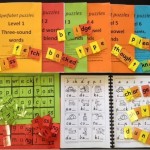Phonics With Feeling Set 10 now available
1 Replies
I’ve just put six brand new Set 10 Phonics With Feeling printable decodable readers into the Spelfabet website shop. Like all these books, they cost 40c per print to make 5 copies, or 20c per print to make 30 copies. You provide the paper/card, printer and assembly time, which of course adds to the real cost, but if you’re short of funds, these are a very affordable way to boost your library of decodable text.
The Set 10 books target ways to spell the following sounds:
- /or/ as in ‘August’, ‘caught’, ‘thought’, ‘walk’, ‘warm’, ‘board’, ‘poor’, ‘for’, ‘more’, ‘four’, ‘saw’ and ‘all’, in a story about a girl called Audrey learning to be herself.
- /er/ as in ‘her’, ‘turn’, ‘first’, ‘learn’, ‘work’ and ‘journey’, in a story about a girl called Kirsty who teaches her mum and brother about earthworms.
- The unstressed vowel spelt ‘r’, as in ‘our’, ‘fire’ and ‘pure’ (in Australian and UK English, pronounced /r/ in US and some other Englishes), in a story about a boy called Albie who longs to find a blue flower he sees in a dream.
- /o/ as in ‘was’, ‘fault’, ‘cough’ and ‘hot’, in a story about a boy called Walter who learns from an encounter with a wasp on a yacht that he’s not afraid of water.
- /u/ as in ‘brother’, ‘cousin’, ‘blood’ and ‘fun’, in a story about a boy called Douglas who has some cousins who are well-behaved, and some who get up to mischief.
- /i/ as in ‘gym’, a book about words with this unusual spelling, and their origins in Ancient Greek.
Like all the Phonics With Feeling books, these books come with printable yes/no quizzes, each with 20 questions. The quizzes are also free to use on Wordwall, you can put some or all the questions into other formats e.g. Kahoot, or use them as a stand up/sit down or heads/tails type trivia quiz in class, once everyone has read the book.
The only difference between the parent/aide version and the teacher/clinician version is how many copies can be printed: 5 of the parent/aide version, 30 of the teacher/clinician version.
We hope these books help children practise the targeted sound-spelling relationships to mastery, that they can relate to the stories, and that they sometimes prompt interesting follow-up discussion of characters’ feelings, like pride, disgust, anger, love, fear, hope, and excitement.



I question bundling so many common sounds with different spelling into one book. I think it is too complex for reading learners to cope with. Better to teach in word families. Pronunciation varies across territory and time. We don’t teach that children must pronounce ‘brother’ as if it is a ‘u’. If it is said as a short ‘o’ it is still English and still understandable. And ‘blood’ is a pure Danish word even today. Spelt the same way but said as if it rhymes with ‘food’. It is the written language since the time of Dr Johnson that stablises the way we speak. And let’s be grateful there are only 26 letters in the alphabet and not 170 or 650 characters to learn. I disagree that English spelling is complex.